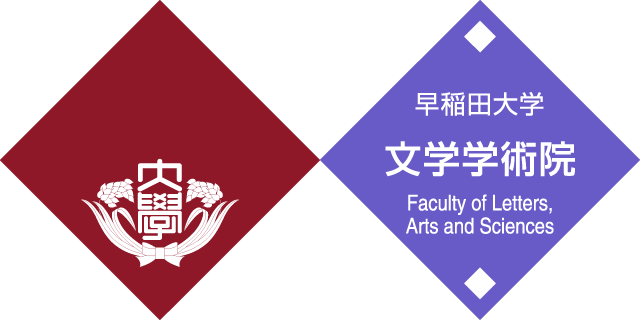- News
- Event report: “Teaching about/with/through nature and Japanese literature” by Dr. Christina Laffin
Event report: “Teaching about/with/through nature and Japanese literature” by Dr. Christina Laffin
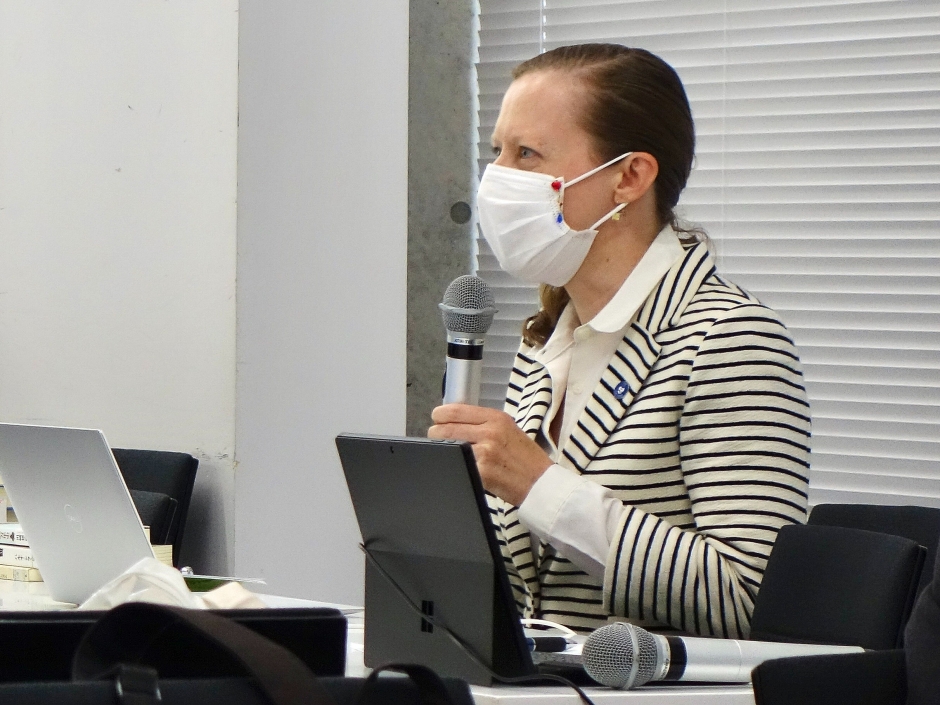
- Posted
- Fri, 09 Sep 2022
“Teaching about/with/through nature and Japanese literature” by visiting associate professor, Dr. Christina Laffin from the University of British Columbia was organized and held by the Global Japanese Studies Model Unit at Waseda University. The lecture welcomed a total of 53 participants, including 24 Waseda University undergraduate and graduate students and faculty members in person, and 29 participants from external academic institutions and the general public online.
The lecture focused on engagement with climate change faced by the world, what can be done from the perspective of the study of premodern literature, and how this could be taught. It started with the question of whether the ‘sense of crisis’ we have about the climate change is in itself wrong.
During the first half, natural disasters in British Columbia caused by the effects of climate change, and the environmental movement and the issues surrounding them were discussed. This included active environmental movements such as appeals by students at the University of British Columbia (hereinafter UBC) to various governments, and lobbies for the university to release forest reserves. It was pointed out that, since UBC stands on land belonging to the indigenous Musqueam people, the university has publicly supported the students’ environmental movement and has even taken advantage of it for publicity purposes.
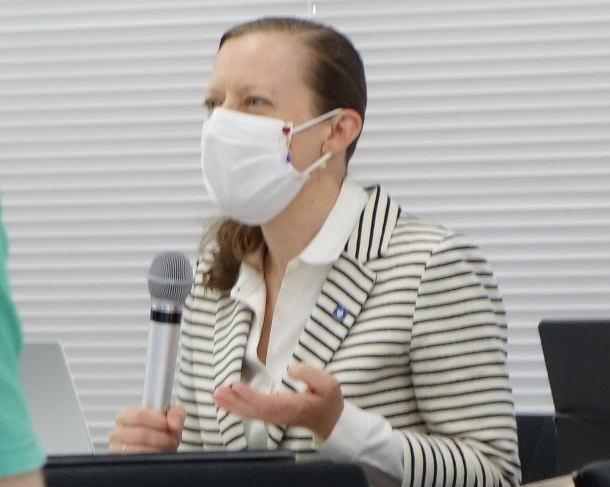 However, Dr. Laffin challenged the problem of tackling climate change in a crisis-engaged way, citing a paper by Kyle Whyte of University of Michigan, ‘Against Crisis Epistemology’. Whyte is a cultural anthropologist enrolled in the Citizen Potawatami Nation who specializes in Native American studies, and he criticizes in his paper the use of narratives such as “unprecedented, emergency” to inflame the “sense of crisis”, which in turn justifies colonization.
However, Dr. Laffin challenged the problem of tackling climate change in a crisis-engaged way, citing a paper by Kyle Whyte of University of Michigan, ‘Against Crisis Epistemology’. Whyte is a cultural anthropologist enrolled in the Citizen Potawatami Nation who specializes in Native American studies, and he criticizes in his paper the use of narratives such as “unprecedented, emergency” to inflame the “sense of crisis”, which in turn justifies colonization.
So in what direction should the issues surrounding climate change be dealt with? Dr. Laffin suggested that, based on Whyte, co-ordination, rather than solution-oriented actions is the key. In other words, she offered his conclusions that coordinating between 1) moral bond, and 2) kinship is the only way.
In the second half of the session, the topic shifted to the question of how to express these climate change issues in the study of literature, particularly in premodern Japanese literature. First, it was pointed out that in the study of modern Japanese literature, while research has progressed since the 1970s mainly in the UK and the US from the perspective of ecocriticism and environmental humanities, it has not spread very far. These studies deal with the literature of Michiko Ishimure and Hiromi Ito, as well as the literature of disasters represented in the post-311 ones. There are also studies that discuss the nature depiction in Japanese literature of the Meiji period, like as represented by Haruo Shirane’s work.
Then, in order to discuss nature and climate change in premodern literature, Dr. Laffin’s teaching practice up until now was presented in order to address how this could be done, and specifically, how it could be developed in a university class context. She expressed that a physical and sensory experience is important to further understand literature in diary form, and as an example, she introduced the ideas of having students walk through the Nitobe Memorial Garden at UBC to experience nature and write about what they noticed, and having students actually do a ”moon viewing” and write about their impressions. In addition, the audience was asked to comment on these classes and also to come up with new class ideas.
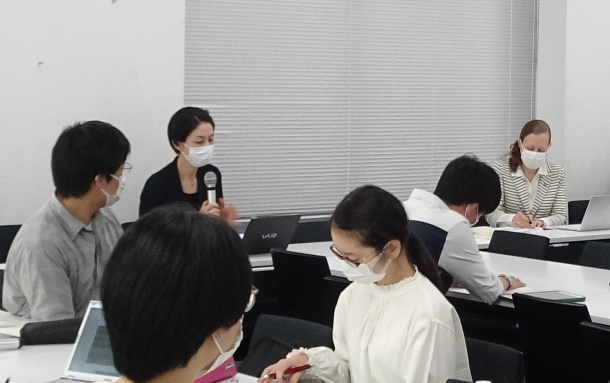
Professor Satomi Yamamoto (History of Medieval Japanese Painting) began her comments by explaining the background to holding her seminar, ‘Humanities in the Anthropocene’ at the University’s Institute for Advanced Study, themed on how climate change affects human activities or how it changes the behavior of human activities, and what the humanities can do. She then referred to Haruo Shirane’s interpretation of ‘secondary nature’, which was particularly relevant to this lecture. She argued that the power of ‘fictional’ arts, which is expressed in literature, paintings and other art forms as ‘tamed nature’ instead of the originally rugged one, is what people accept, and that this is where the humanities can play a role.
In the question-and-answer session, concrete suggestions and opinions on approaches to climate change in premodern literature were given by the participating faculty members and postgraduate students. Examples of researchers who have become environmental activists through the study of waka poetry were also given, and the close connection between literature, nature and environmental issues was shared.
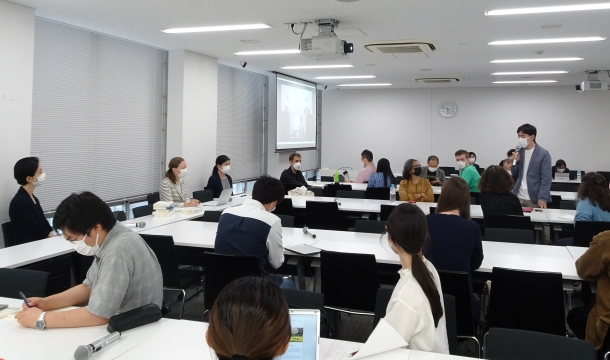
In closing, the moderator Professor Kimiko Kono commented as follows: If we consider the process where Chinese poetry was born in the harsh natural environment of China, and how it was accepted in Japan and poetry was born, we can see the characteristics of the acceptance of nature in Japanese literature by comparing it with how the surrounding regions within the Kanji cultural sphere have accepted nature in their literature and developed it into their languages. Literature is words, and it has a power that science does not possess, so we may be able to uncover the power of literature and poetry through reflection from the span of human history. Dr. Laffin and Professor Yamamoto also expressed sympathy with these comments, and the meeting came to a close.
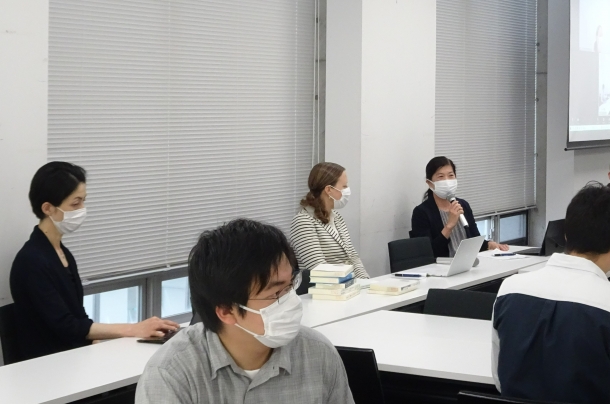
Event details
- Date: June 1, 2022
- Time: 16:30 – 18:00 (JST)
- Venue: Waseda University, Toyama Campus, Building 33, 3F Conference Room 1
- Lecturer: Dr. Christina Laffin
- Language: Japanese, and English and Japanese for each Q&A session
- Free of charge
- Open to the public through Zoom
- Tags
- Event Reports
